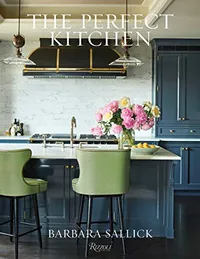Kitchen island trends 2023 – 9 new looks for your kitchen's focal point that marry style and functionality
2023 will see glamorous details, softened edges and modern materials at the forefront of our kitchens

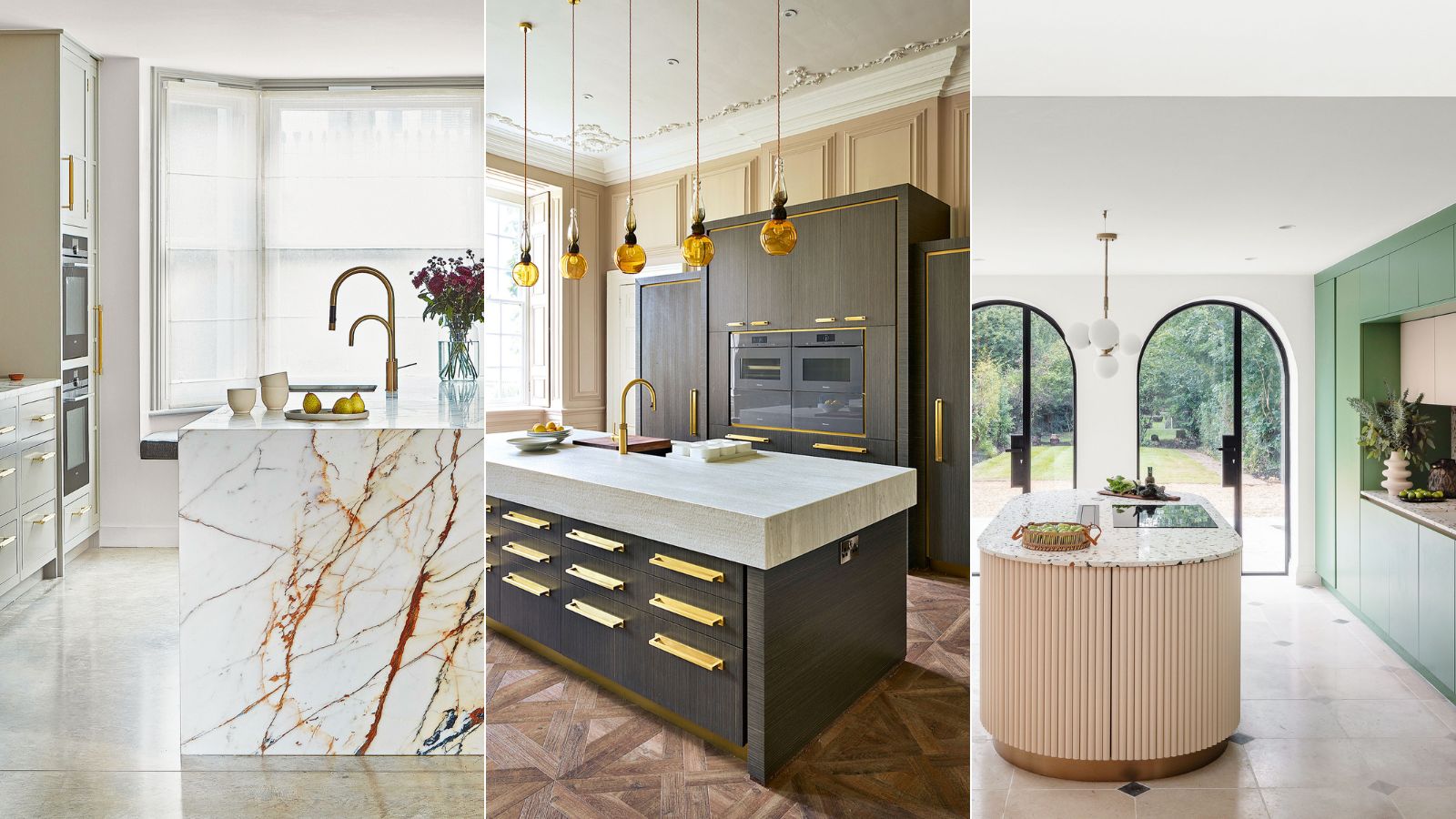
When it comes to the best kitchen island trends, it can be a minefield of designs, colors, and materials. Providing ample space for entertaining, generous storage, and room for all the latest gadgets, a kitchen island is at the top of most homeowners’ wish lists, so harness the full potential of this coveted kitchen focal point by choosing bold shapes, materials, and design twists.
With exciting new kitchen brands cropping up and lots of innovative design ideas and clever twists on older designs on display in kitchen showrooms across the US, there are plenty of on-trend looks and contemporary designs to pick from.
With this in mind, we've talked to some of our favorite kitchen designers and kitchen trend experts to find out which kitchen island trends will be big in 2023 to make choosing a beautiful new kitchen island a simple decision.
The Perfect Kitchen, Barbara Sallick | From $21.87/£30.45 at Amazon
Learn more about the fundamentals of kitchen design in this bestselling book. Find practical advice as well as hundreds of images to inspire your own remodel
Kitchen island trends
Below, we look at the biggest kitchen island trends and new kitchen ideas and pictures of kitchens to help you decide whether a new kitchen island is an option for you.
1. A social island
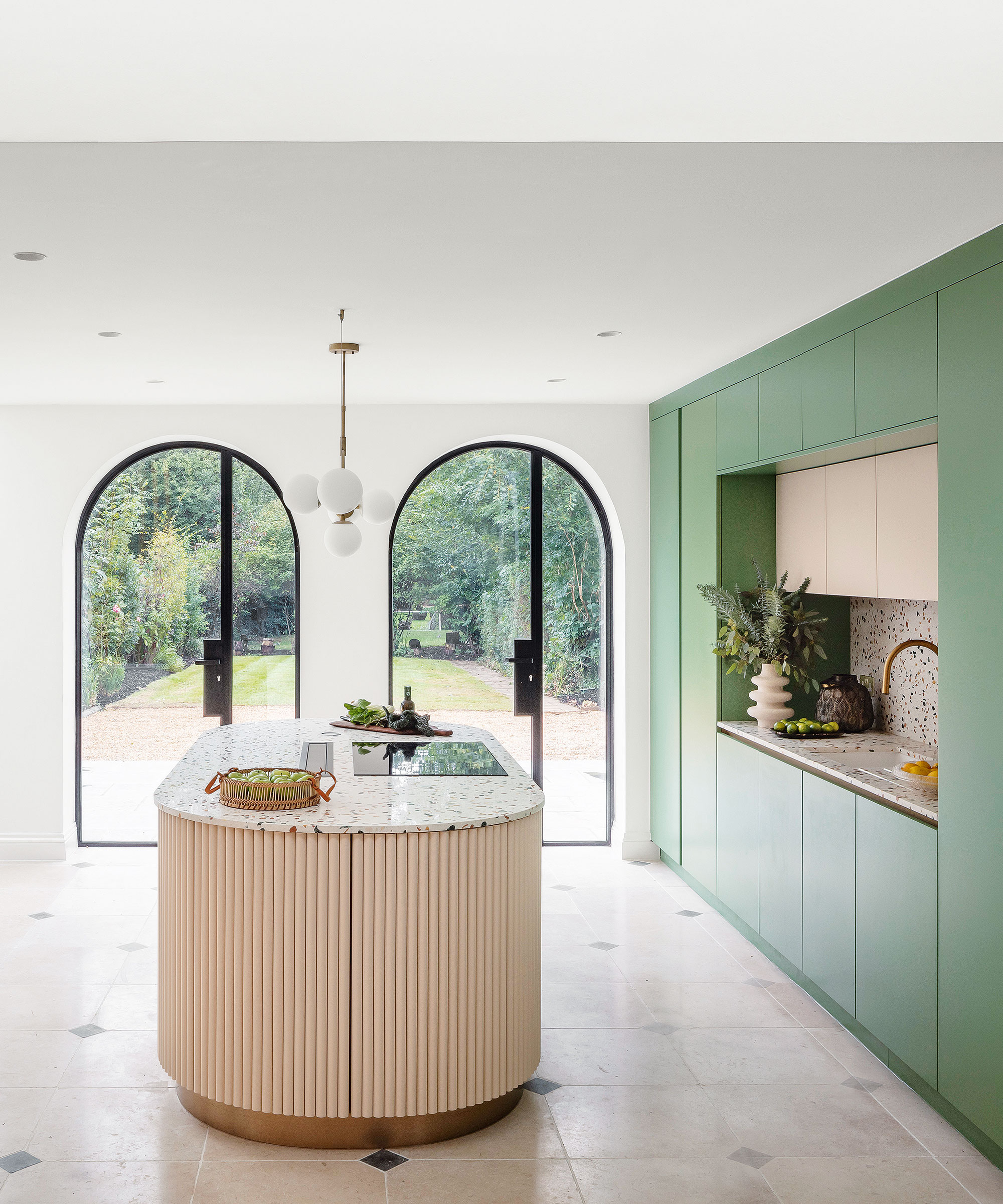
Bespoke painted kitchen with fluted island and terrazzo; Sheraton Interiors
Activate the ergonomic benefits of curves to get the party flowing. Curvaceous design, once popular in the 80s, is back in vogue. Full-on voluptuous or gently rounded, fluidity in design will lift a kitchen layout and soften the overall look of your room, adding a bold design focus or a subtle touch of shaping to your kitchen.
‘A rounded island comes into its own when entertaining, especially in kitchens with multiple entrance/exit points, making it easier for guests to socialize and encouraging smooth transition between spaces,’ says Shehryar Khan, director, Sheraton Interiors. ‘A curved island can also include a more expansive seating area, allowing guests to comfortably eat and socialize around the island.’
2. An island fit for the family
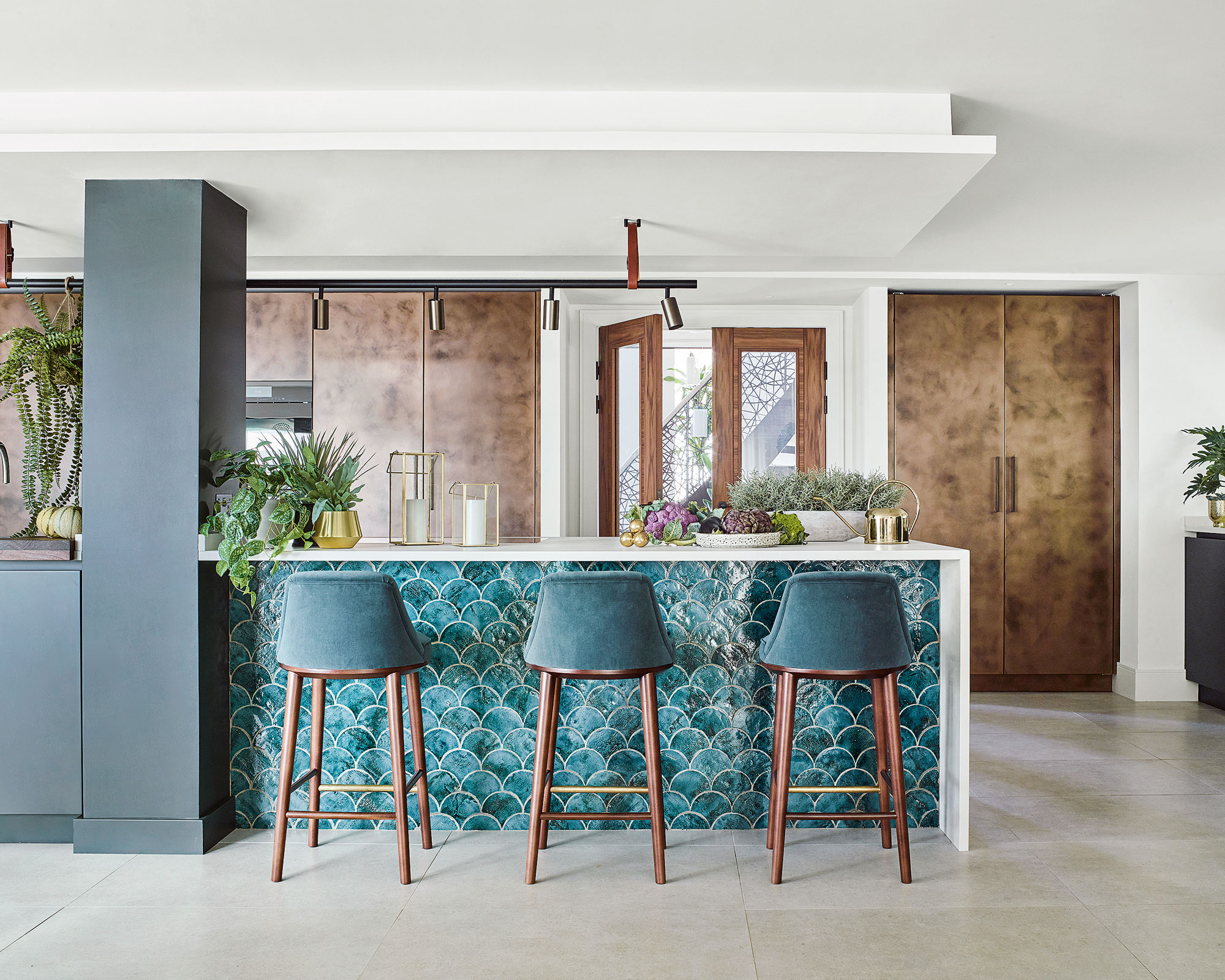
Urbo kitchen in patinated bronze and Studio Green matt lacquer; Roundhouse Design. Project by Pfeiffer Design
Catering for cooking, dining, socializing, and relaxing, the latest trend for enhanced family kitchens suggests that we should be looking for an island design that will appeal to the whole family.
Design expertise in your inbox – from inspiring decorating ideas and beautiful celebrity homes to practical gardening advice and shopping round-ups.
Whether on an island unit or peninsula, a breakfast bar will boost your kitchen’s social status immeasurably. Encourage guests to settle down, and stay out of the cook’s way, by selecting bar stools for comfort as well as looks. A high-backed upholstered stool offers similar support to a dining chair. Pay attention to height, and seating numbers too.
'Sitting in a line is great at the sushi bar but not for kitchen islands, so three is the magic number for straight line seating,' says Peter Humphrey, the design director and founder of Humphrey Munson. 'If you need four stools, then wrap them around one end of the island so it’s more sociable. When you choose your counter stools always check the dimensions and have them drawn into the kitchen design to ensure they fit perfectly with plenty of space to maneuver around.'
3. Statement islands with a 'waterfall edge'
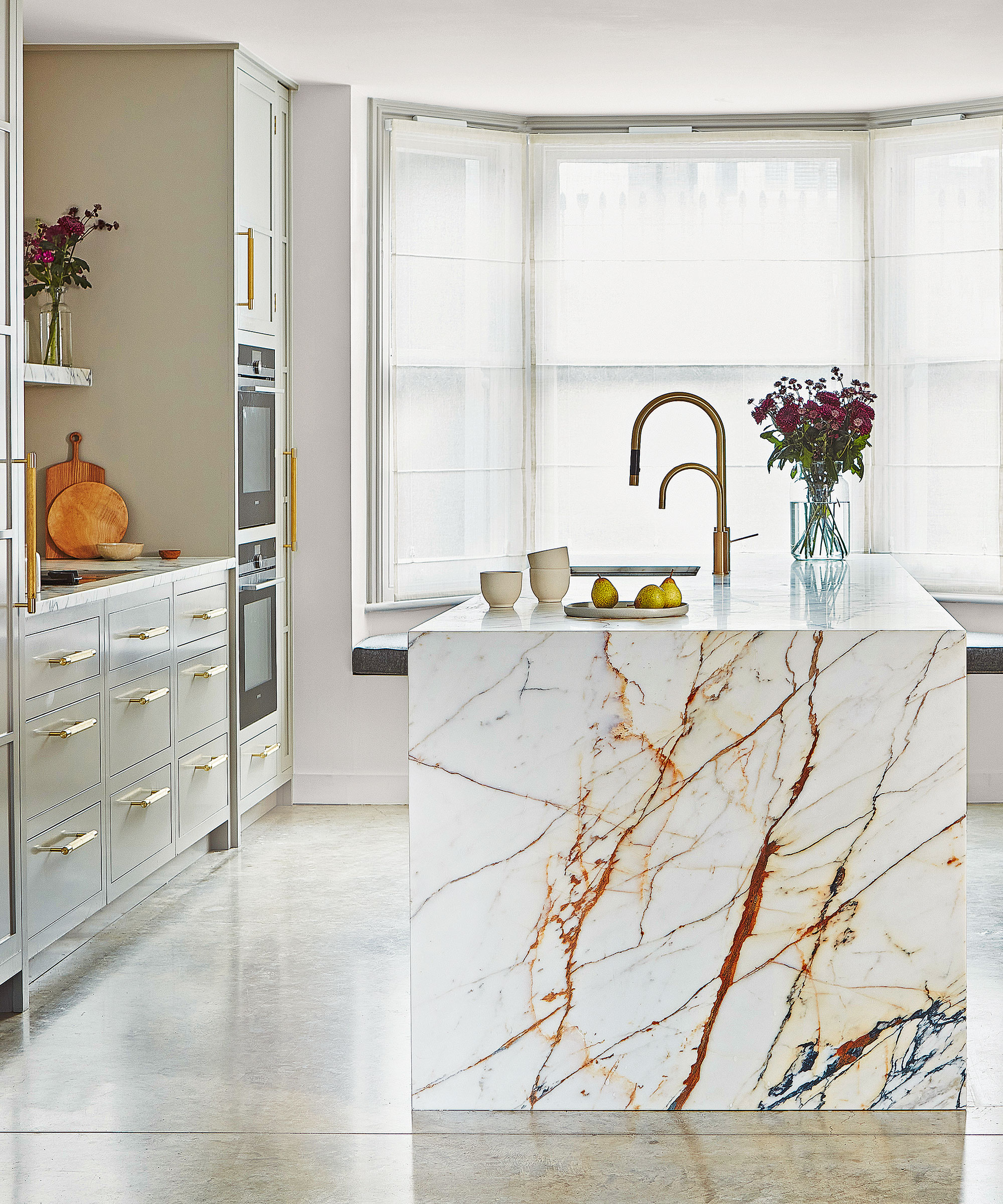
Bespoke kitchen with Paonazzo marble worktops; Blakes London
Glamor and elegance will make a welcome return in 2023. Although the kitchen is a functional space, this doesn’t mean it can’t have personality and style. 'Don’t be afraid of experimenting and taking risks with modern materials,' says interior designer Kelly Wearstler. 'Glamor and style can be introduced to a kitchen through material and color choices without sacrificing practicality.'
A popular design feature, a ‘waterfall edge’ involves continuing the kitchen countertop seamlessly from horizontal to vertical. ‘Deeply veined marbles look particularly fabulous, especially if you source a slab large enough to allow the veining to flow right down to the floor,’ enthuses Oana Sandu, lead designer, Blakes London. ‘It’s important to think about the flooring and how it will complement your choice of countertop – usually, a contrast works best.’
4. Dynamic design
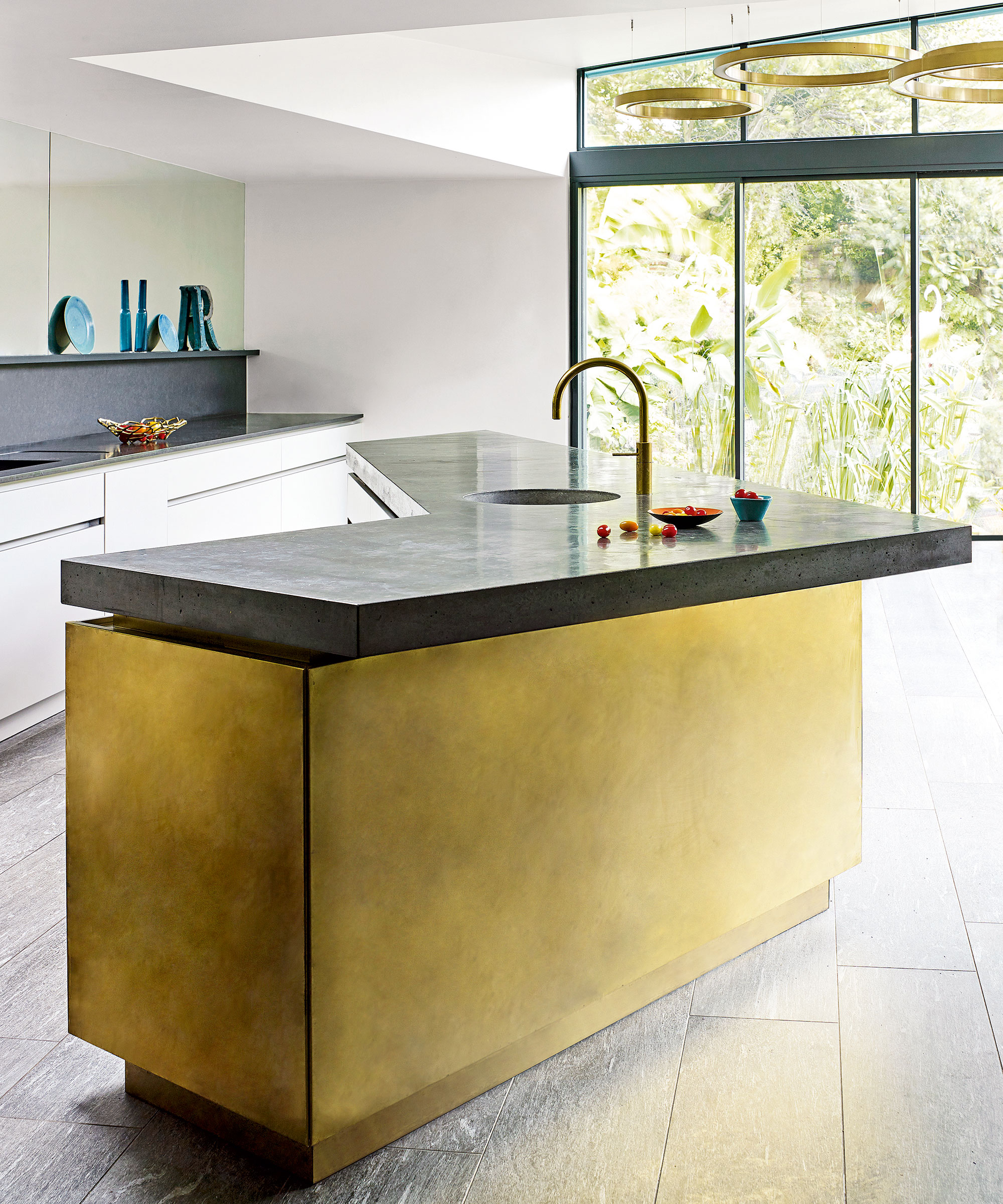
Urbo and Metro matt lacquer bespoke kitchen; Roundhouse
Think outside the box with an island shape that’s totally unique. ‘It’s a brave move to step beyond classic rectangular designs but the pay-off can be huge in terms of visual impact.
Here, we designed the island to look like a beautiful piece of furniture. It reflects the owners’ adventurous personality, while also helping to zone the open-plan room,’ explains Jane Powell, designer, Roundhouse.
5. Naturally modern materials
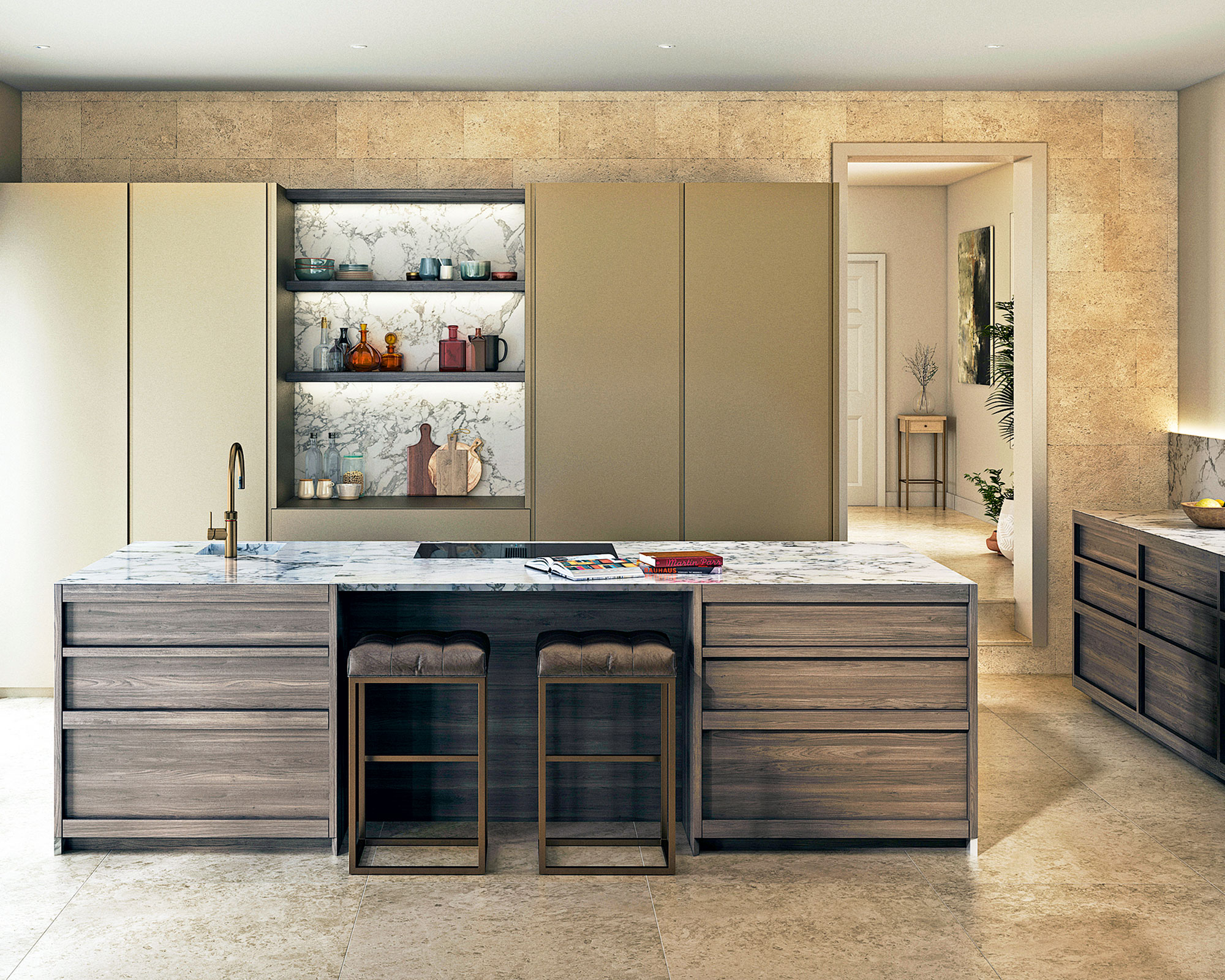
Hanami Collection in fossilized oak and Calacatta marble; minotticucine London
A move to sustainable kitchen design and natural materials will see more and more people reaching for wood in 2023.
While many of us are tempted to have painted kitchen joinery for its wipe-clean ease, varnished natural wood, with its innate beauty, sets an artisanal and interesting tone. ‘Wood has been used to make furniture for kitchens for hundreds of years,’ says designer Sebastian Cox. ‘Seeing how a piece of furniture is made and understanding its form makes it incredibly beautiful.’
For a truly one-off island design, look to naturally unique materials. ‘We love to use nature-made materials in a very contemporary way,’ says Achala Knights, head of design at minotticucine London. ‘The contrast between the natural fluidity of defined woodgrain or heavily veined marble, against the crisp lines of modern cabinetry feels unexpected. The simple form of our furniture means there are no visual distractions, just the beauty of nature.’
6. Size matters
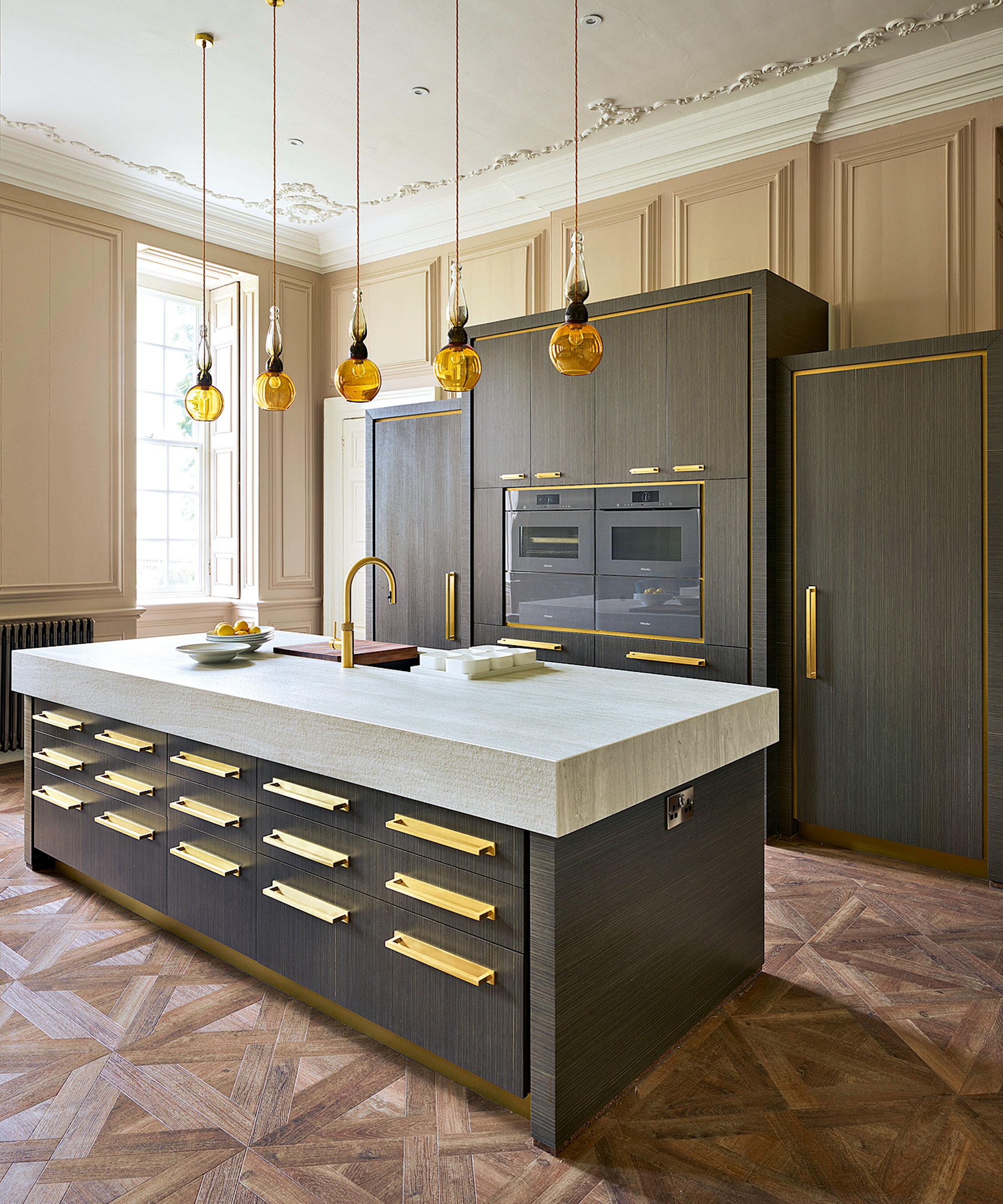
Bespoke kitchen; Chiselwood. Strata Argentum sintered stone worktop; Neolith
Large kitchens provide the luxury of space – so include more features geared to your lifestyle. It’s the perfect opportunity to include a capacious and glamorous island, perhaps positioned in the center of the room so that its beautiful shape can be enjoyed to the maximum.
Generously sized kitchens call for an island with ample proportions to ensure it doesn’t appear lost in the space. Here, Chiselwood used chunky worktops and outsized handles for an eye-catching island. ‘The thickness of the worktop was achieved by mitring deep strips around the perimeter. You get striking depth without excessive weight on the cabinetry beneath,’ explains design director Martin Holliday.
7. Hidden joints
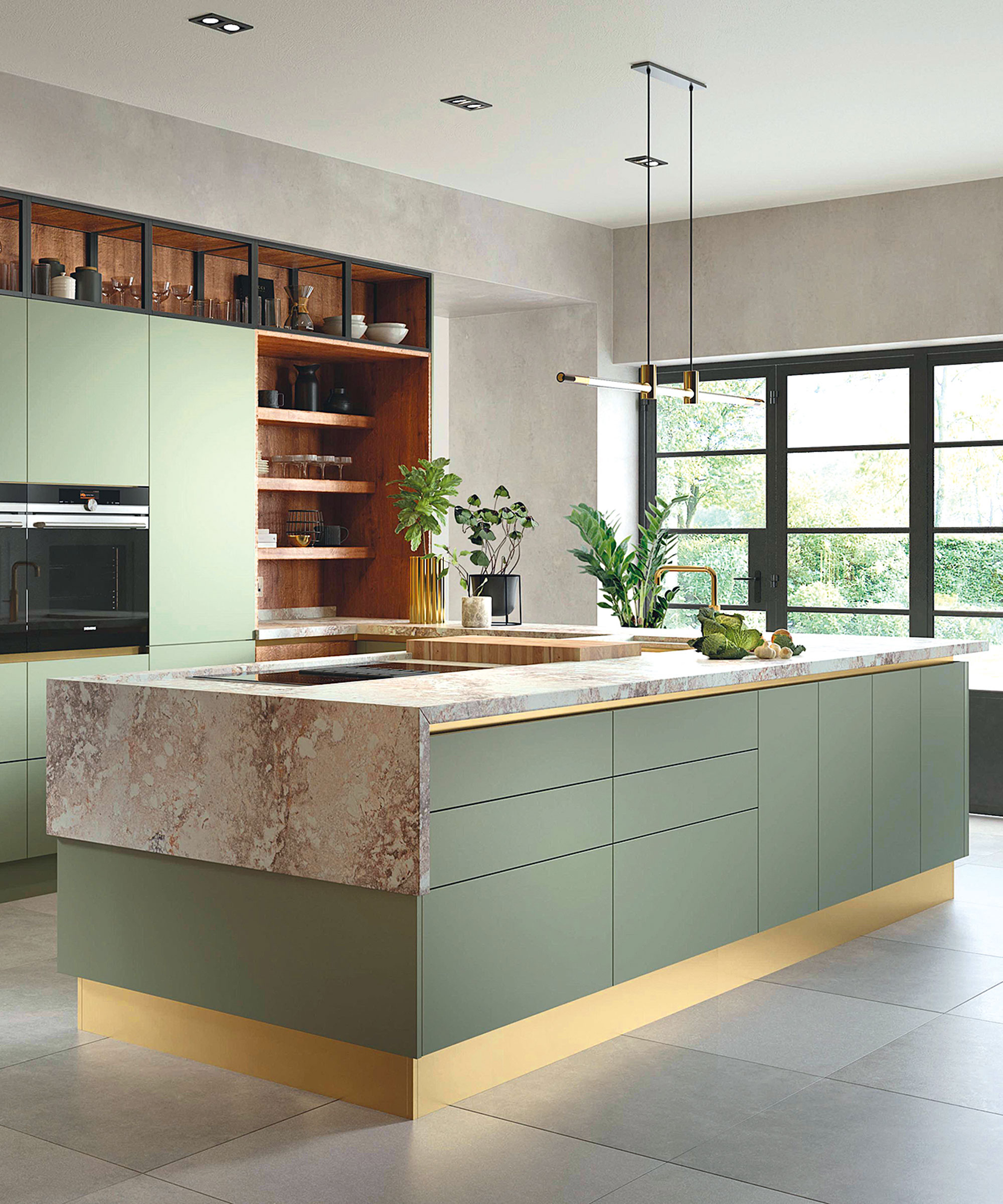
Vivid kitchen, Life Kitchens
No one likes the appearance of often unsightly joints in their kitchen cabinetry, and islands are the same. Do your best to hide them with materials that wrap around the island, or by including features that can hide them; your guests will be none the wiser.
When plotting the size of your island, do consider the impact it has on the worktop installation. ‘Joints can be really obvious on island units that are centrally positioned and designed to be noticed,’ says Graeme Smith, head of retail design, Life Kitchens. Islands longer than 3.5m usually require two slabs of stone or quartz. ‘Adding timber elements such as chopping blocks or breakfast bars is a good way to mix materials while hiding joints,’ he says.
8. Shapely designs
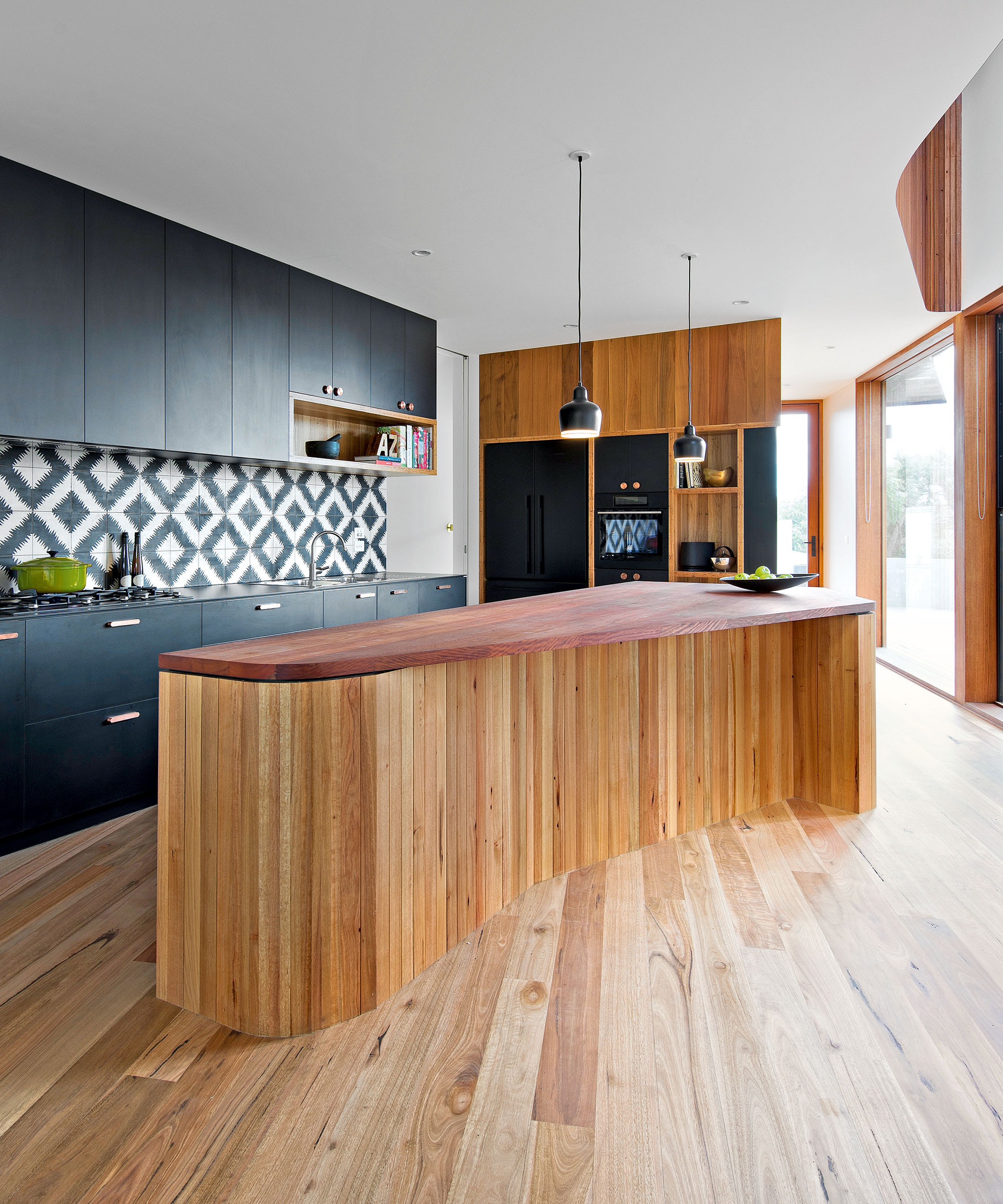
Zig Zag wall tiles by Popham Design; Day True
With the emphasis on the kitchen as a family space, used for socializing and relaxing as well as preparing food, regimented rows of units and clinical design can look a little stark, which is why H&G predicts that we will move away from ultra-modern interiors and onto more organic, gentle shapes for our islands.
Fluid shapes lend movement and dynamism to this island, sculpted to aid smooth passage through an open-plan home. The work of Australia-based Auhaus Architecture, the island is made from Australian hardwood with an oiled finish. Formed from vertical planks, the structure appears to rise out from the flooring below.
9. Fluted details
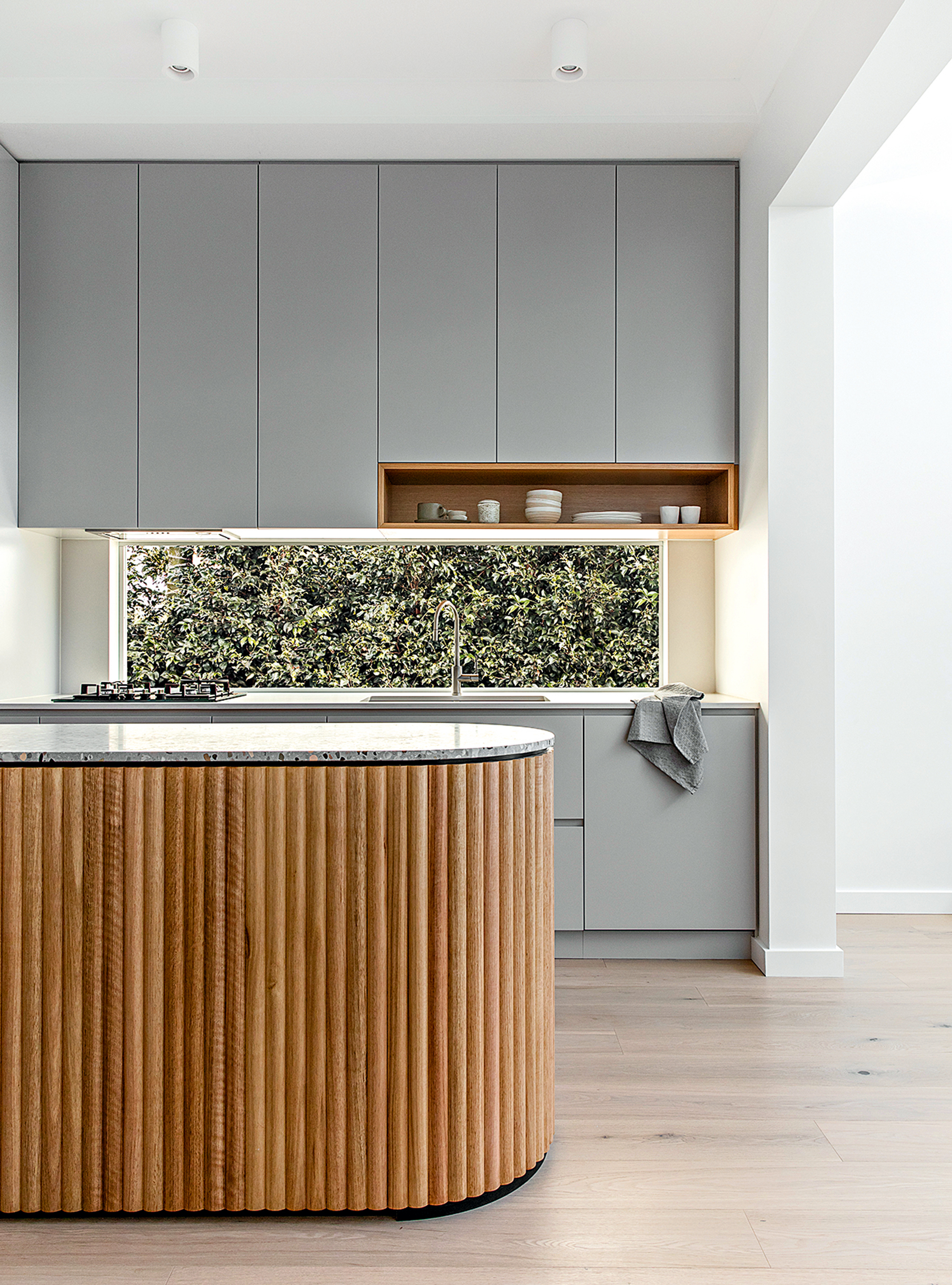
Kitchen designed by Kitty Lee Architecture. Build by Wyatt Projects
Poised for the ultimate comeback, fluted design is once again working its undulating charms.
Fluting can be far more than just a decorative surface. In this relatively narrow kitchen by Australia-based Kitty Lee Architecture, ease of movement around the island was crucial and fluting served a practical purpose.
‘The fluted detail allowed us to create a beautiful feature around a curved form, adding texture, warmth, and contrast to the space, while also improving the traffic flow and ergonomics,’ says director, Kitty Lee.
It was created using individual 30mm-wide half-round dowels in Tasmanian oak, which is a dense and resilient hardwood with excellent staining qualities.
Are islands going out of style?
Kitchen islands are not going out of style. We would argue that kitchen islands are more popular than ever. If you've ever wondered whether you should invest in an island, it is first worth hearing about the benefits that one could bring to your home.
An island will make the most of a spacious kitchen by putting functionality at its heart. In a very large room, it will act as a bridge between perimeter furniture, improving the work triangle and allowing more than one cook to work comfortably side-by-side. With the addition of arresting light pendants or an eye-catching work surface, it can become the room’s design centerpiece. In an open-plan kitchen, use an island or peninsula to divide cooking and dining.
Connect water and electricity, and your island will become an impressive workhorse that can incorporate cooking, washing, and cooling appliances. 'This will free up surfaces in the rest of the kitchen but the island is also regarded as an opportunity to have extra ovens or specialist appliances such as a teppanyaki or barbecue grill,' adds Neil Lerner.
When should you not have a kitchen island?
A kitchen island is not suited to every type of kitchen. In fact, if your kitchen is less than 4 meters wide, we don't recommend adding an island at all. However, that is not to say that you can't have one in a small kitchen. These days, there are many, less sizeable, options for kitchens with limited square footage.
'Size is everything,' says Peter Humphrey, the design director and founder of Humphrey Munson. 'The negative space, i.e. the space between furniture, is as important as the size of the unit itself. The golden rule is to allow 1-1.2m to move around easily, but there are times when going narrower is justified – for example when the dishwasher door is open. We use quartz worktops almost exclusively on our islands because they are low maintenance, easy to clean, and come in jumbo slabs to avoid joints.'

Jennifer is the Digital Editor at Homes & Gardens, bringing years of interiors experience across the US and UK. She has worked with leading publications, blending expertise in PR, marketing, social media, commercial strategy, and e-commerce. Jennifer has covered every corner of the home – curating projects from top interior designers, sourcing celebrity properties, reviewing appliances, and delivering timely news. Now, she channels her digital skills into shaping the world’s leading interiors website.
